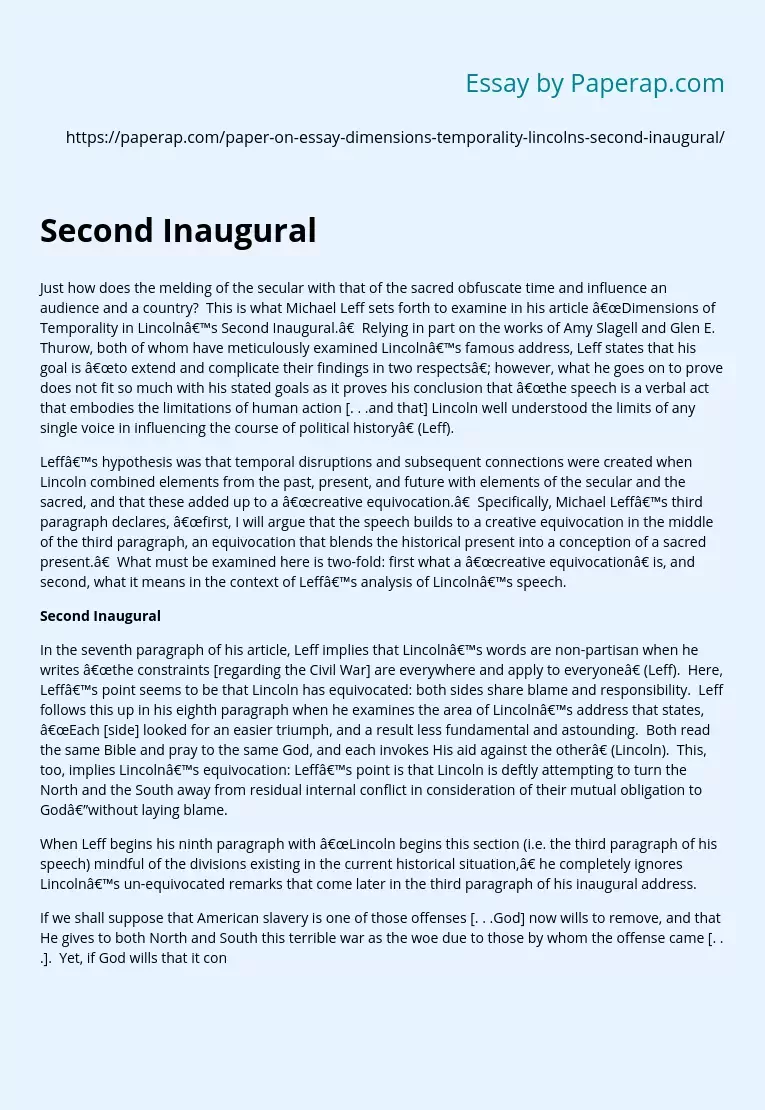"Dimensions of Temporality in Lincoln’s Second Inaugural"
The following example essay on “Dimensions of Temporality in Lincoln’s Second Inaugural” is an analysis of an article of the same name by Michael Leff that analyzes Lincoln’s speech.
Just how does the melding of the secular with that of the sacred obfuscate time and influence an audience and a country? This is what Michael Leff sets forth to examine in his article “Dimensions of Temporality in Lincoln’s Second Inaugural.” Relying in part on the works of Amy Slagell and Glen E.
Thurow, both of whom have meticulously examined Lincoln’s famous address, Leff states that his goal is “to extend and complicate their findings in two respects”; however, what he goes on to prove does not fit so much with his stated goals as it proves his conclusion that “the speech is a verbal act that embodies the limitations of human action [. . .and that] Lincoln well understood the limits of any single voice in influencing the course of political history” (Leff).
Leff’s hypothesis was that temporal disruptions and subsequent connections were created when Lincoln combined elements from the past, present, and future with elements of the secular and the sacred, and that these added up to a “creative equivocation.” Specifically, Michael Leff’s third paragraph declares, “first, I will argue that the speech builds to a creative equivocation in the middle of the third paragraph, an equivocation that blends the historical present into a conception of a sacred present.” What must be examined here is two-fold: first what a “creative equivocation” is, and second, what it means in the context of Leff’s analysis of Lincoln’s speech.
In the seventh paragraph of his article, Leff implies that Lincoln’s words are non-partisan when he writes “the constraints [regarding the Civil War] are everywhere and apply to everyone” (Leff). Here, Leff’s point seems to be that Lincoln has equivocated: both sides share blame and responsibility. Leff follows this up in his eighth paragraph when he examines the area of Lincoln’s address that states, “Each [side] looked for an easier triumph, and a result less fundamental and astounding. Both read the same Bible and pray to the same God, and each invokes His aid against the other” (Lincoln). This, too, implies Lincoln’s equivocation: Leff’s point is that Lincoln is deftly attempting to turn the North and the South away from residual internal conflict in consideration of their mutual obligation to God—without laying blame.
When Leff begins his ninth paragraph with “Lincoln begins this section (i.e. the third paragraph of his speech) mindful of the divisions existing in the current historical situation,” he completely ignores Lincoln’s un-equivocated remarks that come later in the third paragraph of his inaugural address.
If we shall suppose that American slavery is one of those offenses [. . .God] now wills to remove, and that He gives to both North and South this terrible war as the woe due to those by whom the offense came [. . .]. Yet, if God wills that it continue until all the wealth piled by the bondsman’s two hundred and fifty years of unrequited toil shall be sunk, and until every drop of blood drawn with the lash shall be paid by another drawn with the sword, as was said three thousand years ago, so still it must be said ‘the judgments of the Lord are true and righteous altogether’” (Lincoln).
Clearly, Lincoln is stating that the South’s continuation of enslaving Africans was wrong in the eyes of God, and that if the war does go on, it only does so because all of America must repay the sins of the Confederate Army. There is no equivocation here—creative or otherwise—and in ignoring this, Leff seems to be consciously avoiding the obvious flaw (i.e. contradiction) in a part of his hypothesis.
The second point which Michael Leff intends to make is “to show that this conflation [of secular and sacred resulting in temporal shifting] is central to the form of the speech and serves as the vehicle for sustaining its major themes.” Attempting to prove this, Leff points to several sections within Lincoln’s speech that reference biblical passages and/or concepts, and while there is no doubt that Lincoln does make these references, Leff has overstated their purpose.
Not wishing to diminish Lincoln’s speech in any way, one must still evaluate Lincoln’s biblical references within their historical context. Lincoln does not use this tactic to shift his audience and his countrymen from the past to the present and into the future as hoped by Leff; he uses the one unifying thing that he can to attempt to overcome “the limitations of human action,” while “[understanding] the limits of any single voice in influencing the course of political history” (Leff). In other words, in a country painfully divided, Lincoln has grabbed hold of the one potentially common element—Christianity—in the hope that it might serve to push through the fighting that had gone on and the wounds that still festered.
Lincoln was only able to turn to the sacred as a means of unification of the secular because at the point in history at which he delivered his address, the country that was brutally divided over slavery, was predominately Christian. Temporality had absolutely nothing to do with it.
Leff’s work is not without merit: it adds depth to what had been the extent of the work surrounding Lincoln’s speech, and it adds new ideas to the available scholarship. Unfortunately, it appears that Leff entered into his review with a concrete idea in mind and failed to see that what he set out to prove was somewhat different from what he did prove.
"Dimensions of Temporality in Lincoln’s Second Inaugural". (2019, Dec 05). Retrieved from https://paperap.com/paper-on-essay-dimensions-temporality-lincolns-second-inaugural/

